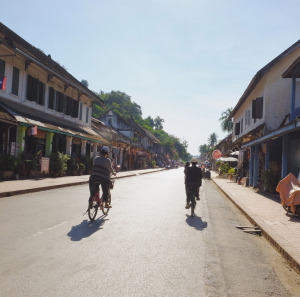Obstacles for persons with vision disabilities

In Laos, a developing country, disability is often misunderstood and misrepresented. People with vision disabilities, for example, can only acquire higher education with government permission. The Lao government itself still views, ‘disabilities’ as medically defined health issues. The government has adopted international and regional policies in addressing the needs of persons with disabilities and promoting inclusive education policies. Although the education system appears to be poorly financed and weak in many parts, as it lacks basic facilities such as braille textbook, qualified teachers, public libraries to promote the education of people with vision disabilities.
Access to education is considered a crucial part of human development in the World, but in my country, we face many challenges from school to university, because the education system lacks basic facilities. Teachers are not trained and have no experience in teaching persons with disabilities. Vision impaired persons were allowed to study in university only since 2015.
Difficulties in finding a job
People with disabilities in Laos, live in poverty, have limited opportunities in education, health, suitable housing and employment opportunities. In my own experience, accessing the job market is very difficult for people with vision disabilities. Getting a job is more difficult than finishing school for blind people in my country. Blind people can only work in massage parlours to make their living, because we are not able to find any other jobs. Overcoming the negative attitude: “blind people are not able to do anything” is a significant challenge for people with vision disabilities. When persons with vision disabilities apply for a job, they are usually rejected because employers think blind people will be a burden in the office.
Obstacles of travel
 People with vision disabilities across the world experience many travel challenges. In lower-middle income countries like mine, these challenges are especially pronounced as a consequence of poverty, inaccessible public infrastructure and transport, and no tactile paving for people who are blind, which, in turn, limit independent travel for blind people. Tactile Paving is very important to travel independently in the city. Public transportation is another problem and it is not accessible in Laos. In general, it is very difficult for vision impaired people who to travel in Laos.
People with vision disabilities across the world experience many travel challenges. In lower-middle income countries like mine, these challenges are especially pronounced as a consequence of poverty, inaccessible public infrastructure and transport, and no tactile paving for people who are blind, which, in turn, limit independent travel for blind people. Tactile Paving is very important to travel independently in the city. Public transportation is another problem and it is not accessible in Laos. In general, it is very difficult for vision impaired people who to travel in Laos.
The several points that I have mentioned are some of the main challenges for persons with vision disabilities in my country. In conclusion I can say that people with disabilities are less likely to be employed and more likely to be paid less for the same work. Lack of education and skills means that a person with vision disability is less employable. Negative attitudes and lack of access to transport and buildings, create major obstacles for people with vision disabilities. This is the reason why blind people don’t want to be active and most of us want to do only massage for living. And this leads to poverty which means that many blind people live in housing unsuited to their needs.







